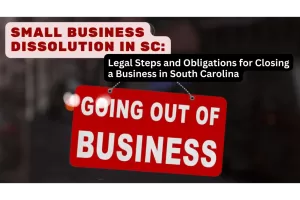
Small business dissolution in South Carolina involves critical legal steps and obligations to ensure a smooth and compliant closure. At Ligon Business & Estate Law, we provide expert guidance to business owners throughout this process.
- Board Resolution: Initiate the dissolution process by obtaining a board resolution or majority vote from shareholders, depending on your business structure. This formal decision is the foundation for closure.
- Legal Notifications: Notify all pertinent parties, including employees, creditors, suppliers, and customers, about the business’s dissolution. This entails sending formal notices and adhering to state-mandated advertising requirements.
- Tax Responsibilities: Address all federal, state, and local tax obligations. This includes filing final tax returns, settling outstanding liabilities, and adhering to tax regulations.
- Debt and Liability Management: Liquidate business assets to settle debts and liabilities properly. Notify and compensate creditors following a prioritized order.
- Employee Matters: Comply with federal and state employment laws when terminating employees. Ensure final paychecks, benefits, and required notifications are handled appropriately.
- Permits and Licenses: Cancel or transfer business licenses, keys, and registrations as per local regulatory requirements.
- Contractual Agreements: Review and fulfill all contractual obligations, including lease agreements and contracts with suppliers or service providers.
- Final Filings: File the necessary dissolution documents with the South Carolina Secretary of State, such as Articles of Dissolution, to formally terminate the business entity.
- Asset Distribution: Allocate any remaining assets to shareholders or partners by the business’s governing documents.
- Record Keeping: Maintain meticulous records of all dissolution actions to meet legal and regulatory obligations.
Navigating the dissolution process can be intricate, but with our legal expertise at Ligon Business & Estate Law, we can help you close your small business in South Carolina efficiently and responsibly. Experienced experts will help you through the necessary legal steps, protect your interests, and minimize potential legal complications that may arise during the dissolution process.
How do I close a small business in South Carolina?
Closing a small business in South Carolina involves several important steps to ensure a legal and orderly dissolution. Here’s a general guide on how to complete a small business in the state:
- Hold a Board Resolution or Shareholder Vote: If your business is structured as a corporation or LLC, hold a board resolution or a majority vote of shareholders to approve the dissolution officially.
- Notify Employees: Inform your employees about the closure in compliance with federal and state labor laws. Address final paychecks, benefits, and any accrued paid time off (PTO).
- Pay Outstanding Taxes: Settle outstanding federal, state, and local taxes. This includes filing final tax returns and paying any remaining tax liabilities.
- Address Debts and Liabilities: Liquidate business assets to pay off debts and liabilities. Notify creditors and follow a prioritized order for repayment.
- Notify Creditors and Suppliers: Send written notice to creditors, suppliers, and service providers, informing them of the business’s closure. Settle any outstanding accounts payable.
- Cancel Business Licenses and Permits: Contact relevant government agencies to cancel or transfer business licenses, permits, and registrations.
- Comply with Regulatory Requirements: Depending on your business type, industry-specific regulations may apply. Ensure compliance with any additional requirements.
- File Articles of Dissolution: If your business is a corporation or LLC, file Articles of Dissolution with the South Carolina Secretary of State. This document formally terminates your business entity.
- Distribute Remaining Assets: Distribute any remaining assets to shareholders or members according to the business’s operating agreement or bylaws.
- Maintain Records: Keep detailed records of all dissolution activities, including notifications, payments, and filings, for future reference.
- Cancel Lease Agreements: If your business leases space, notify your landlord and follow the terms of your lease agreement to terminate the lease properly.
- Dispose of Business Records: Safeguard or dispose of sensitive business records by legal requirements.
- Notify Customers and Clients: Inform customers or clients about the closure and address any pending orders or contracts.
- Close Bank Accounts: Close all business bank accounts and settle outstanding balances.
- Retain Legal and Financial Counsel: Consider seeking financial and legal advice to comply with all laws and regulations.
Closing a business is a complex process, and corporate requirements may vary in structure and industry. Consulting with an attorney or a certified public accountant (CPA) specializing in business dissolution can help ensure you follow all necessary steps and legal obligations when closing your small business in South Carolina.
What is an administrative dissolution SC?
An administrative dissolution in South Carolina is a legal process by which the state’s Secretary of State or another relevant state authority revokes the legal existence of a business entity (such as a corporation or LLC) that has failed to meet certain statutory obligations or regulatory requirements. This typically occurs when a business entity has neglected its responsibilities, such as:
- Failure to File Annual Reports
- Failure to Pay State Taxes
- Failure to Maintain a Registered Agent
- Failure to Update Business Information
- Expiration of Duration
When a business entity is administratively dissolved in South Carolina, it loses its legal status and protection. It cannot continue to operate or engage in lawful activities until the issues causing the dissolution are rectified. To reinstate a dissolved entity, you must resolve the outstanding issues, pay any fees or penalties, and file the necessary paperwork with the state authorities. Addressing administrative dissolution promptly is essential to avoid potential legal and financial complications.
How do I close my SC sales tax account?

Closing a South Carolina sales tax account involves several steps to ensure you meet all legal and regulatory requirements. Here’s a general guide on how to complete your SC sales tax account:
- File Your Final Sales Tax Return
- Pay Any Outstanding Tax Liabilities
- Cancel Your Sales Tax License
- Return Your Sales Tax Certificate:
- Notify Customers
- Keep Records
- Follow Up
It’s important to note that your sales tax account should only be closed after all tax liabilities have been satisfied and your final sales tax return has been filed. Additionally, the SCDOR may have specific procedures or forms for closing sales tax accounts, so it’s advisable to contact them directly for guidance and to ensure compliance with state regulations.
Closing your SC sales tax account properly helps you avoid potential issues and ensures you fulfill your legal obligations when discontinuing your business operations.
How do I remove a member from an LLC in South Carolina?
Leaving a South Carolina LLC member typically involves several steps and may require adherence to the operating agreement or state laws governing LLCs. Here’s a general guide on removing a South Carolina LLC member:
- Review the Operating Agreement
- Hold a Member Vote
- Offer a Buyout
- Amend the Operating Agreement
- Update State Records
- Provide Written Notice
- Transfer Assets and Liabilities
- Update Tax Records
- Seek Legal Counsel
Remember that the procedures and prerequisites for dismissing a member from an LLC can differ from one operating agreement to another and from state law to state law.
Through consultation with an attorney, Ligon Business & Estate Law can both provide individualized counsel and guarantee that the procedure will be carried out in a manner that is by South Carolina regulations.
Get in touch with us if you need information!





